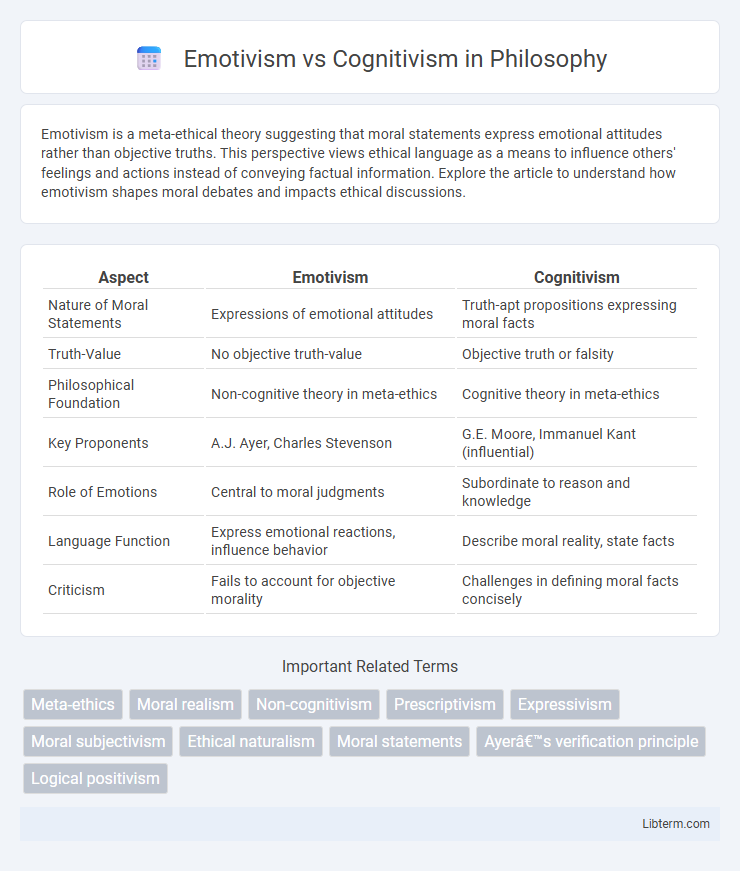Emotivism is a meta-ethical theory suggesting that moral statements express emotional attitudes rather than objective truths. This perspective views ethical language as a means to influence others' feelings and actions instead of conveying factual information. Explore the article to understand how emotivism shapes moral debates and impacts ethical discussions.
Table of Comparison
| Aspect | Emotivism | Cognitivism |
|---|---|---|
| Nature of Moral Statements | Expressions of emotional attitudes | Truth-apt propositions expressing moral facts |
| Truth-Value | No objective truth-value | Objective truth or falsity |
| Philosophical Foundation | Non-cognitive theory in meta-ethics | Cognitive theory in meta-ethics |
| Key Proponents | A.J. Ayer, Charles Stevenson | G.E. Moore, Immanuel Kant (influential) |
| Role of Emotions | Central to moral judgments | Subordinate to reason and knowledge |
| Language Function | Express emotional reactions, influence behavior | Describe moral reality, state facts |
| Criticism | Fails to account for objective morality | Challenges in defining moral facts concisely |
Introduction to Emotivism and Cognitivism
Emotivism asserts that moral statements express emotional attitudes rather than factual claims, emphasizing feelings as the basis of ethical judgments. Cognitivism holds that moral statements convey objective truths and can be evaluated as true or false through reason and evidence. Understanding these positions is crucial for analyzing ethical language and the nature of moral knowledge.
Historical Background and Philosophical Origins
Emotivism emerged in the early 20th century as a response to logical positivism, emphasizing that moral statements express emotional attitudes rather than factual claims, largely influenced by A.J. Ayer and C.L. Stevenson. Cognitivism, rooted in classical moral philosophy, asserts that ethical sentences convey objective truths or falsehoods, drawing from the works of Plato and Aristotle and later developed through G.E. Moore's ethical intuitionism. The historical development of these theories reflects a fundamental divide in meta-ethics between viewing moral language as descriptive versus non-descriptive.
Core Principles of Emotivism
Emotivism asserts that moral statements primarily express emotional attitudes rather than factual claims, emphasizing the role of sentiment in ethical discourse. It holds that ethical language functions to influence behavior and evoke feelings rather than to convey objective truths. This approach contrasts with cognitivism, which treats moral propositions as truth-apt statements subject to rational evaluation.
Key Tenets of Cognitivism
Cognitivism asserts that moral statements express beliefs that can be true or false, grounding ethics in objective facts or rational principles. It emphasizes the role of reason in discerning moral truths and holds that ethical propositions are truth-apt, enabling moral knowledge and justification. Key tenets include moral realism, the ability to make rational moral judgments, and the existence of objective ethical facts independent of individual emotions or attitudes.
Emotivism: Strengths and Criticisms
Emotivism, a meta-ethical theory proposing that moral statements express emotional attitudes rather than objective truths, excels in explaining the subjective experience of moral judgments and the motivational power behind ethical language. Its strengths include highlighting the role of emotions in moral discourse and avoiding the metaphysical complications of moral realism. Criticisms target its inability to account for moral disagreement as genuine truth-apt disputes and its failure to provide a foundation for moral reasoning or normative guidance.
Cognitivism: Strengths and Criticisms
Cognitivism asserts that moral statements express beliefs that can be objectively true or false, providing a robust framework for ethical reasoning and debate grounded in rational assessment. Its strength lies in supporting moral realism and enabling consistent ethical discourse by treating moral claims as verifiable propositions. Criticisms target its assumption of universal moral truths, which may overlook cultural diversity and the emotional complexity involved in moral judgments.
Comparison: Emotivism vs. Cognitivism
Emotivism interprets moral statements as expressions of emotional attitudes rather than factual claims, asserting that such statements do not possess truth values. In contrast, Cognitivism holds that moral judgments are cognitive beliefs capable of being true or false, thus subject to objective evaluation. This fundamental distinction frames Emotivism as a non-cognitive theory emphasizing emotional engagement, while Cognitivism treats ethics as a domain of propositional knowledge.
Impact on Moral Language and Ethical Debates
Emotivism asserts that moral language primarily expresses emotional attitudes rather than objective truths, significantly influencing ethical debates by framing moral statements as expressions of approval or disapproval rather than factual claims. Cognitivism, in contrast, treats moral language as capable of conveying true or false propositions about ethical facts, thereby shaping discussions around the possibility of moral knowledge and justification. This divide impacts the way ethical arguments are constructed, with emotivism emphasizing persuasion and subjective experience, and cognitivism focusing on rational analysis and the truth conditions of moral judgments.
Contemporary Relevance in Ethics
Emotivism and cognitivism remain central to contemporary ethical debates, with emotivism emphasizing the expressive function of moral language as reflecting emotional attitudes rather than objective truths, influencing non-cognitivist approaches in metaethics. Cognitivism asserts that moral statements convey factual information and can be true or false, underpinning moral realism and ethical naturalism discussions in applied ethics. Their interplay shapes ongoing discourse on moral objectivity, motivational force, and the role of emotions in ethical decision-making within modern philosophy.
Conclusion: Future Directions in Meta-Ethical Theory
Emotivism emphasizes the expression of emotions rather than objective truth in moral statements, challenging the possibility of universal ethical claims. Cognitivism supports the view that moral statements can be true or false, grounding ethics in rational discourse and objective facts. Future meta-ethical theory may integrate cognitive science insights with emotive linguistic analysis to develop nuanced frameworks that reconcile subjective experience with objective moral reasoning.
Emotivism Infographic

 libterm.com
libterm.com